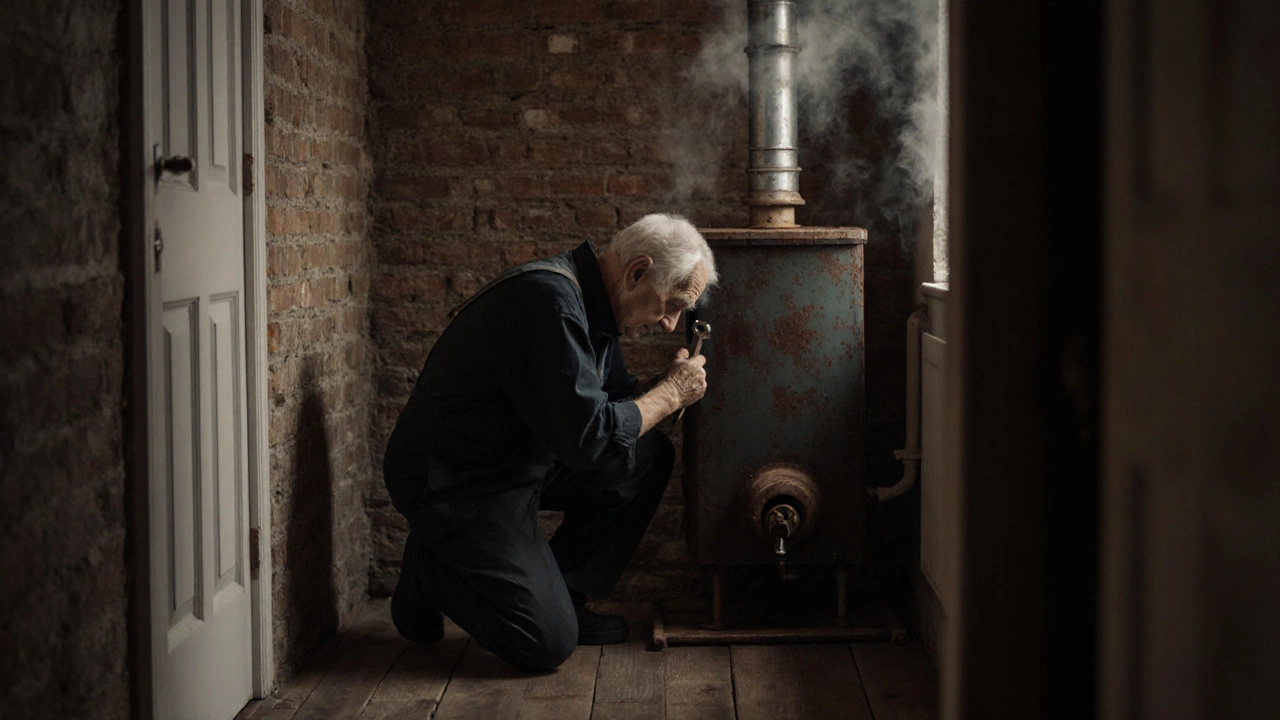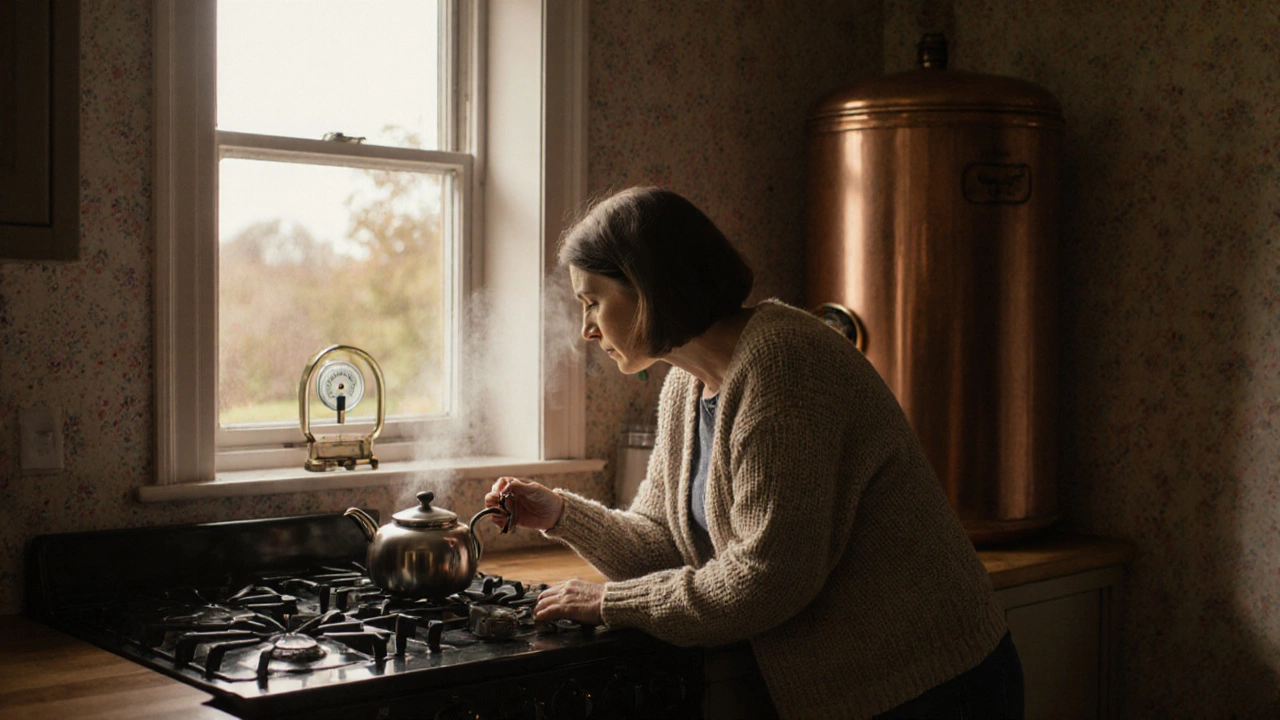Boiler Lifespan Estimator
Enter details about your boiler to estimate its expected lifespan:
Boiler is a closed vessel that heats water or creates steam for central heating and domestic hot‑water systems. Its core components - the heat exchanger, combustion chamber and flue - work together to transfer energy from fuel (gas, oil or electricity) to the building’s HVAC network.
What Determines a Boiler’s Longevity?
Several variables interact to set the clock on a boiler’s service life. The most influential are the fuel type (natural gas, oil, electric, or biomass), the installation quality, routine maintenance schedule, and the materials used in the heat exchanger. Corrosion, scaling, and frequent cycling also wear the internal metal faster.
Environmental factors matter too. Hard water accelerates mineral buildup, while excessive temperature swings can cause thermal fatigue. A well‑ventilated boiler room reduces moisture‑related degradation, and an accurate efficiency rating (e.g., a 90+% AFUE) often signals higher‑quality components that survive longer.
Typical Lifespans by Boiler Type
Not all boilers age the same way. The three main categories - Combi boiler, System boiler and Conventional (regular) boiler - have distinct design traits that affect durability.
| Boiler Type | Typical Lifespan (years) | Fuel Flexibility | Space Requirement | Best Suited For |
|---|---|---|---|---|
| Combi | 10‑15 | Gas or LPG | Very compact (no separate tank) | Small to medium homes with limited space |
| System | 12‑20 | Gas, LPG, oil | Medium (requires hot‑water cylinder) | Medium‑large homes with multiple bathrooms |
| Conventional | 15‑25 | Gas, oil, electric | Larger (separate boiler and cylinder) | Large properties, older setups |
These figures assume regular upkeep and a moderate climate. In regions with aggressive water hardness, even a well‑maintained conventional boiler might see its life clipped by a few years.
Warning Signs Your Boiler Is Nearing the End
When a boiler starts to falter, the symptoms are usually unmistakable. Look out for:
- Frequent short‑cycling - the boiler turns on and off every few minutes.
- Rising fuel bills despite unchanged usage, often a sign of falling efficiency rating.
- Visible rust or water leaks around the heat exchanger and pipework.
- Corrosion‑induced noises - rumbling, banging, or hissing that wasn’t there before.
- Failure of the flue to vent properly, leading to carbon monoxide warnings.
If any of these appear, schedule a professional inspection. Ignoring them can turn a repairable issue into a full replacement.

Extending Your Boiler’s Life: Maintenance Best Practices
The easiest way to push a boiler’s boiler lifespan beyond the average is proactive care. Follow these steps each year:
- Arrange an annual inspection by a certified heating engineer. They’ll check combustion safety, pressure settings, and the integrity of the flue gas system.
- Descale the heat exchanger if water hardness exceeds 150mg/L. A professional can flush the system with a descaling solution, cutting down on mineral buildup.
- Test and, if needed, replace the internal expansion vessel’s pressure valve. An over‑pressurised system stresses seals and welds.
- Clean the burner and replace the ignition electrode annually. A clean burner ensures complete combustion, preserving the heat‑exchanger metal.
- Check for water leaks around the boiler’s casing and pipe connections. Early leak detection prevents corrosion.
Homeowners can also install a water‑softening system to reduce scaling and a low‑pressure cutoff valve to protect the boiler from pressure spikes.
When Replacement Becomes the Smarter Choice
Even with diligent upkeep, a boiler will eventually become uneconomical. Replace when:
- Repair costs exceed 50% of a new unit’s price.
- The unit’s efficiency drops below 80% AFUE, leading to higher energy bills.
- Safety devices (e.g., carbon monoxide detectors) repeatedly trigger alerts.
- The original warranty has expired and parts are scarce.
Choosing a new boiler involves balancing several factors:
- Size and output: A load‑calc (e.g., using the SAP or Manual J method) ensures the new unit isn’t oversized, which would waste fuel.
- Fuel availability: If your region is shifting toward natural gas phase‑out, consider an oil‑to‑biomass conversion or an electric heat‑pump alternative.
- Space constraints: For tight lofts, a compact combi boiler might be the only viable option.
- Environmental impact: Modern condensing boilers achieve >95% efficiency and lower CO₂ emissions.
When the old unit is removed, arrange proper disposal. Many manufacturers run take‑back schemes that recycle the metal core and safely neutralise the refrigerant (if any).
Related Concepts and How They Interact
Understanding boiler lifespan also means seeing where it fits in your broader home‑energy ecosystem.
- HVAC system: The boiler acts as the heat source for radiators, underfloor heating, or fan‑coils. An undersized HVAC distribution can make the boiler work harder, shortening its life.
- Water heater vs. boiler: While a dedicated water heater stores hot water in a tank, a combi boiler provides hot water on demand, reducing storage‑related corrosion.
- Corrosion inhibitors: Adding these chemicals to the system’s water can slow metal loss, especially in older steel‑based heat exchangers.
- Condensate system: Condensing boilers extract latent heat from flue gases, producing condensate that must be drained properly to avoid acidic damage.
- Smart thermostats: By smoothing out demand spikes, they reduce short‑cycling, thereby extending the boiler’s operational hours.
Exploring these connections helps homeowners make informed decisions about upgrades, retrofits, or complete system overhauls.
Frequently Asked Questions
What is the average lifespan of a modern gas boiler?
A well‑maintained modern gas boiler typically lasts 12‑15 years. Premium condensing models with stainless‑steel heat exchangers can push toward 20 years if serviced annually.
Does regular maintenance really add years to a boiler’s life?
Yes. Cleaning the burner, checking the flue, and descaling the heat exchanger remove the main causes of premature wear. Homeowners who follow a yearly service schedule often see a 3‑5 year extension.
Are combi boilers shorter‑lasting than system boilers?
Generally, yes. Because combi units combine heating and instant hot‑water production, they experience higher temperature cycling, which can reduce life to about 10‑15 years versus 15‑20 years for system boilers.
What early‑warning signs indicate a boiler is failing?
Look for frequent short‑cycling, unusual noises (knocking, whistling), visible rust or leaks, a sudden rise in energy bills, and any carbon‑monoxide alarm triggers.
When should I replace a boiler instead of repairing it?
If repair costs exceed half the price of a new unit, the efficiency has dropped below 80% AFUE, safety devices are repeatedly tripping, or parts are no longer available, replacement is the smarter, more economical choice.
How does water hardness affect boiler life?
Hard water leaves mineral deposits on the heat exchanger, which act as insulation and force the boiler to work harder. Over time this leads to overheating, corrosion, and reduced efficiency, shaving years off the lifespan.

